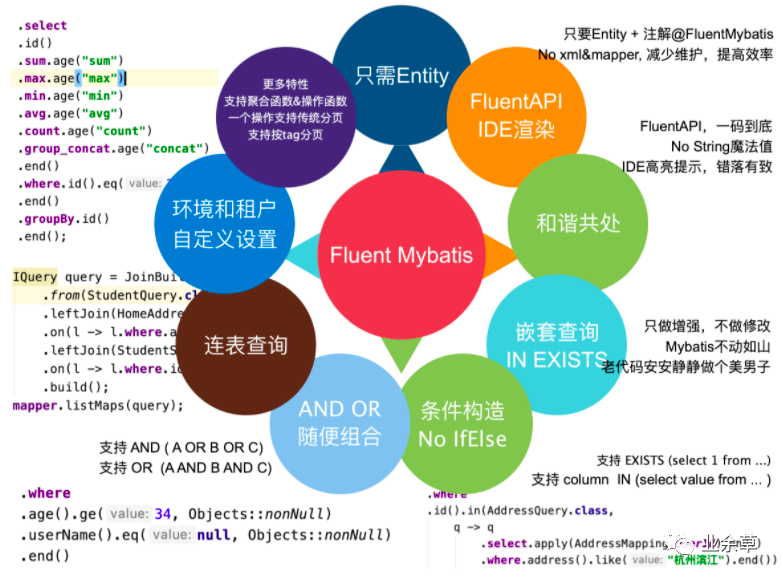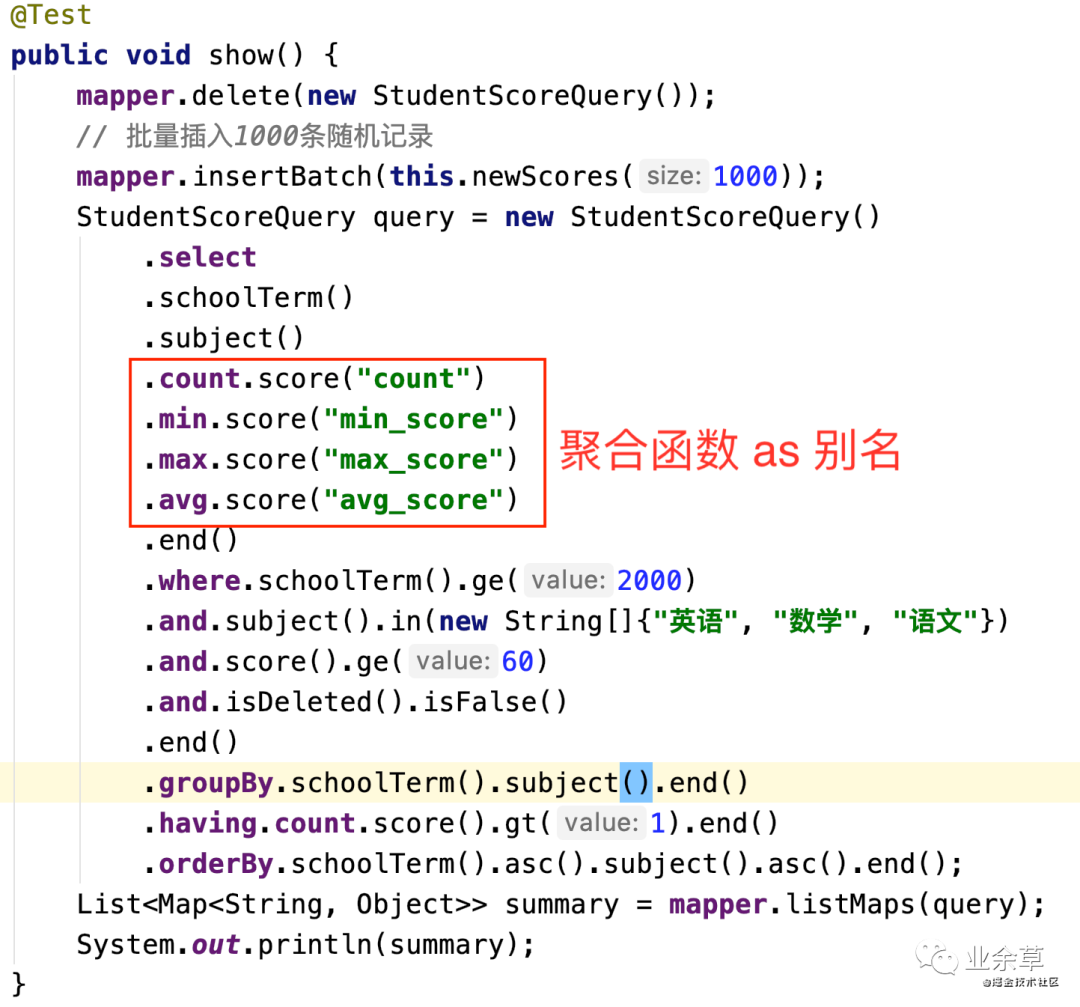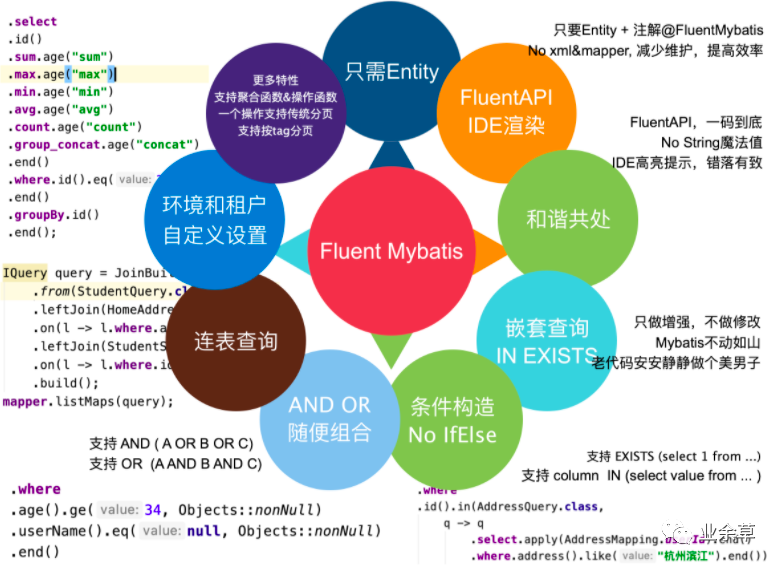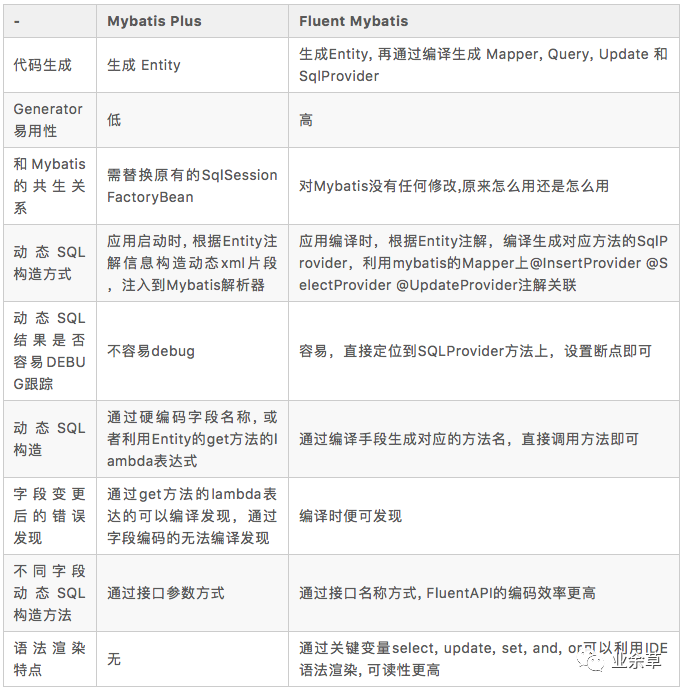再见MybatisPlus,阿里推出新ORM框架!
你知道的越多,不知道的就越多,业余的像一棵小草!
成功路上并不拥挤,因为坚持的人不多。
编辑:业余草
juejin.cn/post/6886019929519177735
推荐:https://www.xttblog.com/?p=5251
使用fluent mybatis也可以不用写具体的 xml 文件,通过 java api 可以构造出比较复杂的业务 sql 语句,做到代码逻辑和 sql 逻辑的合一。不再需要在 Dao 中组装查询或更新操作,或在 xml 与 mapper 中再组装参数。那对比原生 Mybatis,Mybatis Plus 或者其他框架,FluentMybatis提供了哪些便利呢?

需求场景设置
我们通过一个比较典型的业务需求来具体实现和对比下,假如有学生成绩表结构如下:
create table `student_score`
(
id bigint auto_increment comment '主键ID' primary key,
student_id bigint not null comment '学号',
gender_man tinyint default 0 not null comment '性别, 0:女; 1:男',
school_term int null comment '学期',
subject varchar(30) null comment '学科',
score int null comment '成绩',
gmt_create datetime not null comment '记录创建时间',
gmt_modified datetime not null comment '记录最后修改时间',
is_deleted tinyint default 0 not null comment '逻辑删除标识'
) engine = InnoDB default charset=utf8;
现在有需求:
「统计 2000 年三门学科('英语', '数学', '语文')及格分数按学期,学科统计最低分,最高分和平均分, 且样本数需要大于 1 条,统计结果按学期和学科排序」
我们可以写 SQL 语句如下
select school_term,
subject,
count(score) as count,
min(score) as min_score,
max(score) as max_score,
avg(score) as max_score
from student_score
where school_term >= 2000
and subject in ('英语', '数学', '语文')
and score >= 60
and is_deleted = 0
group by school_term, subject
having count(score) > 1
order by school_term, subject;
那上面的需求,分别用fluent mybatis, 原生mybatis和Mybatis plus来实现一番。
三者实现对比
使用fluent mybatis 来实现上面的功能

需要本文具体演示代码可加我微信:codedq,免费获取!
我们可以看到fluent api的能力,以及 IDE 对代码的渲染效果。
换成mybatis原生实现效果
定义Mapper接口
public interface MyStudentScoreMapper {
List<Map<String, Object>> summaryScore(SummaryQuery paras);
}
定义接口需要用到的参数实体 SummaryQuery
@Data
@Accessors(chain = true)
public class SummaryQuery {
private Integer schoolTerm;
private List<String> subjects;
private Integer score;
private Integer minCount;
}
定义实现业务逻辑的 mapper xml文件
<select id="summaryScore" resultType="map" parameterType="cn.org.fluent.mybatis.springboot.demo.mapper.SummaryQuery">
select school_term,
subject,
count(score) as count,
min(score) as min_score,
max(score) as max_score,
avg(score) as max_score
from student_score
where school_term >= #{schoolTerm}
and subject in
<foreach collection="subjects" item="item" open="(" close=")" separator=",">
#{item}
</foreach>
and score >= #{score}
and is_deleted = 0
group by school_term, subject
having count(score) > #{minCount}
order by school_term, subject
</select>
实现业务接口(这里是测试类,实际应用中应该对应 Dao 类)
@RunWith(SpringRunner.class)
@SpringBootTest(classes = QuickStartApplication.class)
public class MybatisDemo {
@Autowired
private MyStudentScoreMapper mapper;
@Test
public void mybatis_demo() {
// 构造查询参数
SummaryQuery paras = new SummaryQuery()
.setSchoolTerm(2000)
.setSubjects(Arrays.asList("英语", "数学", "语文"))
.setScore(60)
.setMinCount(1);
List<Map<String, Object>> summary = mapper.summaryScore(paras);
System.out.println(summary);
}
}
总之,直接使用 mybatis,实现步骤还是相当的繁琐,效率太低。那换成mybatis plus的效果怎样呢?
换成mybatis plus实现效果
mybatis plus的实现比mybatis会简单比较多,实现效果如下

如红框圈出的,写mybatis plus实现用到了比较多字符串的硬编码(可以用 Entity 的 get lambda 方法部分代替字符串编码)。字符串的硬编码,会给开发同学造成不小的使用门槛,个人觉的主要有 2 点:
字段名称的记忆和敲码困难 Entity 属性跟随数据库字段发生变更后的运行时错误
其他框架,比如TkMybatis在封装和易用性上比mybatis plus要弱,就不再比较了。
生成代码编码比较
fluent mybatis生成代码设置
public class AppEntityGenerator {
static final String url = "jdbc:mysql://localhost:3306/fluent_mybatis_demo?useSSL=false&useUnicode=true&characterEncoding=utf-8";
public static void main(String[] args) {
FileGenerator.build(Abc.class);
}
@Tables(
/** 数据库连接信息 **/
url = url, username = "root", password = "password",
/** Entity类parent package路径 **/
basePack = "cn.org.fluent.mybatis.springboot.demo",
/** Entity代码源目录 **/
srcDir = "spring-boot-demo/src/main/java",
/** Dao代码源目录 **/
daoDir = "spring-boot-demo/src/main/java",
/** 如果表定义记录创建,记录修改,逻辑删除字段 **/
gmtCreated = "gmt_create", gmtModified = "gmt_modified", logicDeleted = "is_deleted",
/** 需要生成文件的表 ( 表名称:对应的Entity名称 ) **/
tables = @Table(value = {"student_score"})
)
static class Abc {
}
}
mybatis plus代码生成设置
public class CodeGenerator {
static String dbUrl = "jdbc:mysql://localhost:3306/fluent_mybatis_demo?useSSL=false&useUnicode=true&characterEncoding=utf-8";
@Test
public void generateCode() {
GlobalConfig config = new GlobalConfig();
DataSourceConfig dataSourceConfig = new DataSourceConfig();
dataSourceConfig.setDbType(DbType.MYSQL)
.setUrl(dbUrl)
.setUsername("root")
.setPassword("password")
.setDriverName(Driver.class.getName());
StrategyConfig strategyConfig = new StrategyConfig();
strategyConfig
.setCapitalMode(true)
.setEntityLombokModel(false)
.setNaming(NamingStrategy.underline_to_camel)
.setColumnNaming(NamingStrategy.underline_to_camel)
.setEntityTableFieldAnnotationEnable(true)
.setFieldPrefix(new String[]{"test_"})
.setInclude(new String[]{"student_score"})
.setLogicDeleteFieldName("is_deleted")
.setTableFillList(Arrays.asList(
new TableFill("gmt_create", FieldFill.INSERT),
new TableFill("gmt_modified", FieldFill.INSERT_UPDATE)));
config
.setActiveRecord(false)
.setIdType(IdType.AUTO)
.setOutputDir(System.getProperty("user.dir") + "/src/main/java/")
.setFileOverride(true);
new AutoGenerator().setGlobalConfig(config)
.setDataSource(dataSourceConfig)
.setStrategy(strategyConfig)
.setPackageInfo(
new PackageConfig()
.setParent("com.mp.demo")
.setController("controller")
.setEntity("entity")
).execute();
}
}
FluentMybatis特性一览

三者对比总结
看完 3 个框架对同一个功能点的实现, 各位看官肯定会有自己的判断,笔者这里也总结了一份比较。

对 Fluent Mybatis 感兴趣的网友,支持大家去阅读官方源码,发现更多新大陆!
